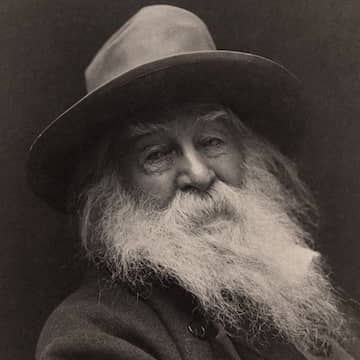Walt Whitman and his Poems

Regarded as one of America's greatest poets, Walt Whitman joins the ranks of Dante, Shakespeare, Virgil, and Homer in terms of artistry and exceptional skill in the written words. One of Whitman's finest works - Leaves of Grass, published in 1855, featured various themes including friendship, nature, democracy, and love. It also presented many praises to the body and soul, as well as discovering reassurance, hope, and beauty in death.
Walt Whitman started his career in Brooklyn, where he pursued a job in the printing industry. As a child, he barely received sufficient formal education. However, this was not a hindrance to his cognitive development since he was rather well-read. At age 12, he was already exposed to the works of famous writers including Shakespeare and Dante. He also read the Bible, which expanded his knowledge not only in literature but also in his faith.
Throughout his lifetime, Walt Whitman undertook different professions. He was not only a printer, but he was also an editor, schoolteacher and reporter. His passion for writing and poetry motivated him to create and publish his first book entitled "Leaves of Grass". This book was written with the inspiration he received from Ralph Waldo Emerson and his vast experience during his travels to various parts of the United States.
It is also worth noting that this book had 8 editions, and Walt Whitman revised and improved the content while adding several other poems. He also considered his first edition of the book a remarkable literary piece in the history of America. Those who have read and discovered much artistry in this book agree with Whitman since his masterpiece was indeed a must-read because of its originality and immense appeal to poetry enthusiasts.
However, the book received mixed reviews from readers and critics alike. For instance, Whitman was noted to have received too little amount of praise from the public because his themes were "out of the ordinary" during that time. The Longman Anthology of Poetry commented that the poet used stylistic innovations and expressed his openness to sex as a theme in his works. Other critics claimed that Whitman did not make use of the regular rhyme and meter in his works. There was also the use of rhetorics and long cadences, which are commonly found in the Bible.
After Walt Whitman published his book, he found himself fired from his job as a clerk at the Department of Interior. This happened because the Secretary of Interior thought of his book as having inappropriate themes. Although he had quite a few critics in America, writers and literary analysts in England were astonished by his poetry. Algernon Charles Swinburne and Dante Gabriel Rossetti were some of the other writers in England who loved his masterpiece.
Aside from writing poetry, Walt Whitman moved to Washington D.C and found employment as a clerk. It was the time of the Civil War, and his eyes were opened to the sufferings of numerous men and women. He was deeply moved after seeing their pain and suffering, that he decided to devote some of his precious time visiting soldiers who were injured in the war. He also helped them by dressing their wounds and sending messages of peace and hope.
Walt Whitman's experience in helping wounded soldiers was one of his inspirations for the poems he wrote in the book published in 1865. Several titles were included in the book such as the poem When Lilacs Last in the Dooryard Bloom'd, which was the poet's elegy dedicated to President Abraham Lincoln.
Walt Whitman was also deeply affected by the slavery in New Orleans, which he discovered when he got a job as an editor in one of the local newspapers. This inspired him to create more poems that delved into the sufferings of these slaves, which also opened the eyes of his readers. However, his works were also criticized by others who were not quite in favor of his personal thoughts and feelings about this subject matter.

In 1873, Whitman suffered a stroke that pushed him to remain in Camden, New Jersey. Walt Whitman died on March 26, 1892, at his home in Camden, New Jersey at age 72. An autopsy revealed that the cause of death was pleurisy. During his funeral, more than 1000 people came and expressed their deep admiration for the poet. His poetry and works endured even after his death, and he was praised for his remarkable talent that influenced other poets of the 20th century such as Allen Ginsberg, William Carlos Williams, and D.H Lawrence, to name a few. Today, Walt Whitman, along with Emily Dickinson, is considered to be the two most influential and iconic American poets of the 19th century.
